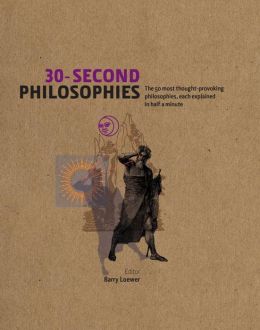I have had an exceedingly philosophical day. I woke up this morning with a severe head cold and sore throat, and after a half-hearted argument for going to school, I was convinced to go back to sleep. Three hours later I awoke with a strong urge to ponder the universe and all it's mysteries. So I grabbed some mint-chocolate chip ice cream, swathed myself in a forest-green comforter, and proceeded to pour over my collection of religion and philosophy books. I started with 30- Second Philosophies by Barry Loewer.
I would most definitely recommend this book to anyone hungry for some food for thought. The title is slightly misleading, considering that the book is less philosophy and more some of the thoughts that make up philosophies: little tidbits of ideas for you to consider and perhaps decide to pursue further with other books. However, the text is succinct and to the point, with an abundance of examples to elucidate the sometimes abstract points it's making. Each philosophy has a long paragraph explaining the ideas, a "three-second thrash" which summarizes in a sentence what the page is about, and a "three-minute thought" that poses some questions to consider and approaches the philosophy from a critical standpoint. I wasn't in love with the art in the book, but the actual content was good, covering ideas from metaphysics to mathematical paradoxes to the human nature. With philosophical warm-up, I then tackled Sam Harris's book/ long essay Letter To a Christian Nation, which I spent the remainder of my day reading.
I'd like to start by ascertaining that I consider myself to be agnostic. I don't follow any faith or religion, but I like to consider religions and the idea that there is something more there, and I am a certified philoceraptor. So I approached Sam Harris's book with an open mind, not prepared to scorn it or totally accept it. In Letter To A Christian Nation, Harris writes to his reader, a stereotypical Christian in modern-day America. He spends the book dissecting religion, poking holes in all the arguments put forth on behalf of Christianity in society. Harris has a very defined point of view; he believes that religion has no place in the modern world and that it is time for society to move on from it; worshiping is an antiquated practice. The arguments made in the book were solid, and pointed out the flaws that no one ever really talks about. It was an eye-opener, and I would definitely recommend it to people of all religions as well as atheists.
My only problem with this work, however, was just how certain the author was in his argument. He was very no-nonsense, and very extreme in his view as an atheist. He didn't leave any room for doubt, it was either take it or leave it with his ideas in the book. Every argument made by religion he smacked down with facts and percentages and assertive statements. I loved the book, and I think it's a good jumping-off point to form your own ideas about what he is saying, so I personally agreed with him but would add to his argument that there is always room in people's minds for philosophy and the consideration of ideas; while I believe that religion as it stands now is harmful to society and horribly twisted and corrupt in some cases, I don't think it is necessary to shut down faith. People should always be asking questions, including the question of is there is some kind of spiritual world out there, or some kind of something more. I think in some respects complete atheism is bad in that it's just another way of not thinking about ideas.
Whether or not you are religious to any extent, I think that reading books like this can only be good for you, because it strengthens your own thoughts and arguments to hear those of other people. This was a short little book, and I read it in a few hours, so I would definitely put it on my must-read list, and I know that I'll be revisiting it in the future.


No comments:
Post a Comment